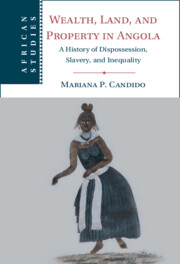Book contents
- Wealth, Land, and Property in Angola
- African Studies Series
- Wealth, Land, and Property in Angola
- Copyright page
- Contents
- Maps and Plans
- Illustrations
- Tables and Graphs
- Acknowledgments
- A Note on Currency and Price-Level Adjustments
- Introduction
- 1 Who Owned What?
- 2 Property Rights in the Nineteenth Century
- 3 Written Records and Gendered Strategies to Secure Property
- 4 Commodification of Human Beings
- 5 Branded in Freedom
- 6 The Erasure of Communal Rights
- 7 Global Consumers: West Central Africans and the Accumulation of Things
- Conclusion
- Bibliography
- Index
- African Studies Series
6 - The Erasure of Communal Rights
Published online by Cambridge University Press: 22 September 2022
- Wealth, Land, and Property in Angola
- African Studies Series
- Wealth, Land, and Property in Angola
- Copyright page
- Contents
- Maps and Plans
- Illustrations
- Tables and Graphs
- Acknowledgments
- A Note on Currency and Price-Level Adjustments
- Introduction
- 1 Who Owned What?
- 2 Property Rights in the Nineteenth Century
- 3 Written Records and Gendered Strategies to Secure Property
- 4 Commodification of Human Beings
- 5 Branded in Freedom
- 6 The Erasure of Communal Rights
- 7 Global Consumers: West Central Africans and the Accumulation of Things
- Conclusion
- Bibliography
- Index
- African Studies Series
Summary
For most West Central African rulers, land was central to subsistence agriculture, meeting their population needs as well as guaranteeing access to future generations. Chapter 6 traces the discussion about land ownership, examining legal changes and the centrality of paper culture for its commodification. The chapter begins by stressing the role of twentieth-century jurists and colonial officers in defending the idea that no notion of possession and individual ownership ever existed in Africa, while simultaneously creating the narrative that individual property had always existed in Europe. Despite earlier evidence that demonstrates a clear perception of occupation and jurisdiction rights among local rulers and West Central Africans, jurists, missionaries, and later, anthropologists and historians claimed that such rights did not exist, emphasizing the centrality of wealth in people, not in land, as forms of accumulation and wealth. In many ways, ethnographers, jurists, and scholars provided evidence to support colonial claims and ideologies that non-Europeans were incapable of apprehending and protecting the basic concept of ownership. This has had lasting consequences on the scholarship on wealth and accumulation in Africa. The refusal to recognize West Central African possession rights sustained colonialism and legitimated occupation and alienation of land and other resources.
- Type
- Chapter
- Information
- Wealth, Land, and Property in AngolaA History of Dispossession, Slavery, and Inequality, pp. 198 - 230Publisher: Cambridge University PressPrint publication year: 2022

